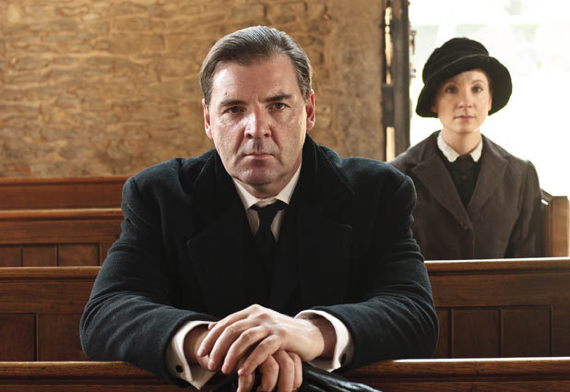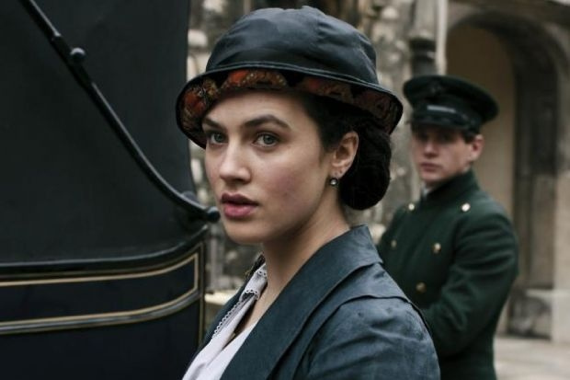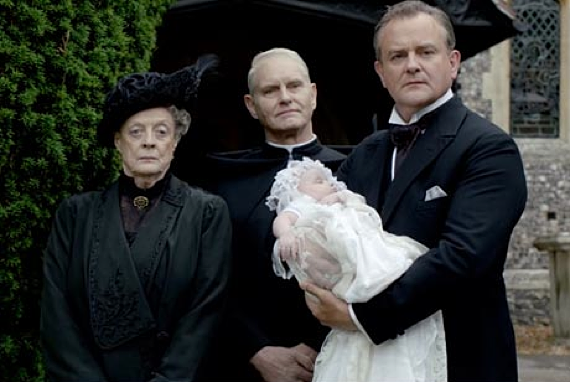Downton Abbey's Prison Drama: A TSW Masterpiece Classic
Downton Abbey Season 3 SPOILER ALERT!
With Mr. Bates in prison, Lady Edith jilted at the altar, a Catholic conundrum, and Carson facing Downton Abbey's first electric toaster, who can cope?You might have been on summer vacation when I wrote "Unchained Melody: Tunes from an 8-Track in an i-Pod World" last July. It was about prison drama, and an obscure 1955 prison film entitled, "Unchained." TSW readers who survived the Sixties were surprised to learn that "Unchained Melody" - the alluring ode to love ingrained in our romantic consciousness by the Righteous Brothers in 1965 - was first written in 1955 for "Unchained," a classic prison movie starring Todd Duncan. In a central scene in the film, Duncan sang the doleful song in a state of despair in his prison cell while mourning his forced separation from his beloved wife. Because of that song, "Unchained" received an Academy Award nomination for Best Musical Score in 1955. The song was later entitled "Unchained Melody" solely because of its association with the prison film.I thought of "Unchained Melody" - both the song and my post of the same title - as I watched a few recent episodes of Downton Abbey. Mr. Bates, formerly valet to the Earl of Grantham, is now in prison - and it seems unjustly so - separated from his beloved new wife, Anna. In one of the episodes, Mr. Bates was suddenly cut off from all visits and letters from Anna because he was caught up in the subversive plots of other prisoners.Prisons haven't changed much since that depiction of a circa 1920 British dungeon. Guards still tear cells apart looking for contraband - sometimes put up to it by the rumors of others getting even for some perceived slight. There is never a shortage of nefarious schemes among prisoners. The constant vigilance required to understand the daily score sheet of enemies and allies, and to see these plots evolving in advance to fend them off, is exhausting. I keep the Prayer to Saint Michael solidly affixed to my cell wall, and it's not just a decoration. It's a prayed necessity. Lots of prisoners ask me for copies of that prayer.I found myself wanting to give a copy to Mr. Bates a few weeks ago. Though one of the more worldly characters of Downton Abbey, he was completely unprepared for the dark twists and turns of prison drama. I don't know whether Mr. Bates is Catholic, but Anglicans come from the same tradition so Saint Michael was as much needed in his prison as in mine. No one watching Downton Abbey could not be moved as Mr. Bates the prisoner and Anna the Ladies' maid were each given a stack of unposted love letters that had been caught up in, then delivered from, the evil plots of prison intrigue. While writing this post, I was a little shocked to realize that all the dramas described in my introduction took place in just two hours of Downton Abbey, and there were many others. Virtually every character was in crisis mode at the same time. Everything tells me I should not even admit that I'm hooked on this British soap opera, but resistance is futile. There is no known treatment for Downton withdrawal.In TSW's "Hits and Misses of 2012," I wrote of my undying admiration for this PBS Masterpiece Classic. My friend, Leo Demers, TSW’s Facebook editor, was once Senior Engineer for PBS, and one of his duties was the final editing of Masterpiece Classics. Not many prisoners watch Downton Abbey despite my glowing reviews. I'm not entirely sure how to interpret the vacant stare I received last week as I described Downton Abbey to my friend, Ralph, who asked what it was about. "It's an historically accurate drama set in post-Edwardian England during and after World War I as the age of the British Nobility diminished under sweeping cultural changes," I told him soberly.All of that describes why I find Downton Abbey to be riveting, but I would swear Ralph actually lost consciousness for a moment somewhere around "post-Edwardian." "Oh," he said, as he furtively slipped away, never to raise the topic again. Our friend, Pornchai, who heard the exchange, said, "I think your TSW posts are better than your TV reviews."THE ALLURE OF HISTORYAll the drama aside, I think the strongest lure of Downton Abbey, for me anyway, is the accuracy of its history. I love history. Pornchai says it's because I was there for most of it and it brings back memories. Nice! Downton's writers did their homework, portraying the post-World War I climate of sweeping cultural change in Europe and America with some hints of how we got to where we are today. History is the uncredited but most welcomed guest star of Downton's weekly drama.In a recent episode, the Earl of Grantham's youngest daughter, Lady Sybil - who "married beneath her" when she ran off with the Earl's Irish Catholic chauffeur - arrived back in Downton after fleeing a riot in Ireland. Lord Grantham learned that his new son-in-law is a dedicated and vociferous rebel against British dominance, and a member of Sinn Fein which supported the Easter Rising of 1916 against British rule of Ireland. Downton Abbey's setting is at the brink of the establishment of the Irish Free State in 1921.
While writing this post, I was a little shocked to realize that all the dramas described in my introduction took place in just two hours of Downton Abbey, and there were many others. Virtually every character was in crisis mode at the same time. Everything tells me I should not even admit that I'm hooked on this British soap opera, but resistance is futile. There is no known treatment for Downton withdrawal.In TSW's "Hits and Misses of 2012," I wrote of my undying admiration for this PBS Masterpiece Classic. My friend, Leo Demers, TSW’s Facebook editor, was once Senior Engineer for PBS, and one of his duties was the final editing of Masterpiece Classics. Not many prisoners watch Downton Abbey despite my glowing reviews. I'm not entirely sure how to interpret the vacant stare I received last week as I described Downton Abbey to my friend, Ralph, who asked what it was about. "It's an historically accurate drama set in post-Edwardian England during and after World War I as the age of the British Nobility diminished under sweeping cultural changes," I told him soberly.All of that describes why I find Downton Abbey to be riveting, but I would swear Ralph actually lost consciousness for a moment somewhere around "post-Edwardian." "Oh," he said, as he furtively slipped away, never to raise the topic again. Our friend, Pornchai, who heard the exchange, said, "I think your TSW posts are better than your TV reviews."THE ALLURE OF HISTORYAll the drama aside, I think the strongest lure of Downton Abbey, for me anyway, is the accuracy of its history. I love history. Pornchai says it's because I was there for most of it and it brings back memories. Nice! Downton's writers did their homework, portraying the post-World War I climate of sweeping cultural change in Europe and America with some hints of how we got to where we are today. History is the uncredited but most welcomed guest star of Downton's weekly drama.In a recent episode, the Earl of Grantham's youngest daughter, Lady Sybil - who "married beneath her" when she ran off with the Earl's Irish Catholic chauffeur - arrived back in Downton after fleeing a riot in Ireland. Lord Grantham learned that his new son-in-law is a dedicated and vociferous rebel against British dominance, and a member of Sinn Fein which supported the Easter Rising of 1916 against British rule of Ireland. Downton Abbey's setting is at the brink of the establishment of the Irish Free State in 1921. The anti-Catholic sentiment of the British nobility was given new power in the Irish rebellion, and this episode of Downton Abbey put it on center stage. The Earl of Grantham had invited the local Anglican Archbishop to dinner. In the midst of the distinguished guests and hovering servants, Lord Grantham's son-in-law showed up having fled British authorities when he dragged the Earl's daughter into an attack against the British nobility in Ireland. This really happened, and seeing this included in Downton's drama was compelling.It resulted in a fascinating exchange between the Church of England Archbishop - who was unaware of the simultaneous drama going on - and the Earl of Grantham whose daughter was missing in action while his fugitive Irish son-in-law, Tom Branson, stood in the next room:
The anti-Catholic sentiment of the British nobility was given new power in the Irish rebellion, and this episode of Downton Abbey put it on center stage. The Earl of Grantham had invited the local Anglican Archbishop to dinner. In the midst of the distinguished guests and hovering servants, Lord Grantham's son-in-law showed up having fled British authorities when he dragged the Earl's daughter into an attack against the British nobility in Ireland. This really happened, and seeing this included in Downton's drama was compelling.It resulted in a fascinating exchange between the Church of England Archbishop - who was unaware of the simultaneous drama going on - and the Earl of Grantham whose daughter was missing in action while his fugitive Irish son-in-law, Tom Branson, stood in the next room:
Archbishop: "Well, I don't want to sound anti-Catholic.”Lord Grantham: "Why not? I am! I don’t want thumbscrews or the rack or anything, but there’s always something so Johnny-foreigner about Catholics!"
Indeed! And no doubt he had Branson in mind. His Sinn Fein son-in-law brought the air of rebellion to Downton Abbey and "shook things up a bit.” Perhaps spurred on by her sister Sybil's excitement, the middle daughter, Lady Edith - recovering from being left standing at the altar by her intended groom - shocked the Earl more than any of them in the same episode. She published a letter in the local newspaper demanding voting rights for women. "GOOD GOD IN HEAVEN!" Lord Grantham bellowed over his newspaper at breakfast.Then tragedy came to Downton Abbey, terrible tragedy. In a heartbreaking episode, Lady Sybil died in childbirth. Her dying wish was for her anti-Catholic family to honor her Irish husband’s faith, and to Baptize and raise her child as a Catholic. The Crawleys are tested to their limit, and there is drama to come. MY VERY OWN TV DRAMAIn a post last year entitled "Downton Abbey Blue Bloods Touch Falling Skies Upon Criminal Minds," I wrote briefly of the role of television in modern prison life. Things have not changed all that much from the attitudes and atmosphere endured by Mr. Bates trapped in a 1920 British prison, but the trappings have changed. Back then, no one went to prison for 67 years.This prison, like many, learned long ago that TV is probably the most cost-effective method of crowd control ever, and an effective cost saving measure. It's a win-win for both prisoners and society. Prisoners purchase their own small personal televisions in the prison commissary, and prisons get to impose some conditions on that purchase. It requires a modicum of behavior, a prison job or work as a full time student, and the saving of funds in advance. A prisoner owning a small TV costs taxpayers nothing, while staffs would likely have to be doubled without it just to maintain order.One New Hampshire taxpayer, reacting to the gross over-crowding and mindless expansion of state budgets due to vastly longer prison sentences, published a letter to the editor in a local paper demanding an end to all prisoners' rights. He suggested downsizing the prison and staff by assigning three prisoners to each bunk and letting them sleep in 8-hour shifts with the remaining 16 hours spent in forced hard labor. I wonder if he watches Downton Abbey. I doubt it.
Not to belay the point, but I am in the midst of a personal crisis of my own that caused me to reflect on the addictive nature of Downton Abbey. I awoke one morning at the end of January to my normal routine, but it met with disaster. After Lauds (Morning Prayer) in my cell, I stirred some instant coffee into a cup of hot water, and then sat down to type. First, as is my habit, I reached for my small television to turn on the news. At least, I tried to. To my instant alarm, the small, 10-inch television I purchased in the prison commissary a few years ago would not turn on. It had died in its sleep during the night.
MY VERY OWN TV DRAMAIn a post last year entitled "Downton Abbey Blue Bloods Touch Falling Skies Upon Criminal Minds," I wrote briefly of the role of television in modern prison life. Things have not changed all that much from the attitudes and atmosphere endured by Mr. Bates trapped in a 1920 British prison, but the trappings have changed. Back then, no one went to prison for 67 years.This prison, like many, learned long ago that TV is probably the most cost-effective method of crowd control ever, and an effective cost saving measure. It's a win-win for both prisoners and society. Prisoners purchase their own small personal televisions in the prison commissary, and prisons get to impose some conditions on that purchase. It requires a modicum of behavior, a prison job or work as a full time student, and the saving of funds in advance. A prisoner owning a small TV costs taxpayers nothing, while staffs would likely have to be doubled without it just to maintain order.One New Hampshire taxpayer, reacting to the gross over-crowding and mindless expansion of state budgets due to vastly longer prison sentences, published a letter to the editor in a local paper demanding an end to all prisoners' rights. He suggested downsizing the prison and staff by assigning three prisoners to each bunk and letting them sleep in 8-hour shifts with the remaining 16 hours spent in forced hard labor. I wonder if he watches Downton Abbey. I doubt it.
Not to belay the point, but I am in the midst of a personal crisis of my own that caused me to reflect on the addictive nature of Downton Abbey. I awoke one morning at the end of January to my normal routine, but it met with disaster. After Lauds (Morning Prayer) in my cell, I stirred some instant coffee into a cup of hot water, and then sat down to type. First, as is my habit, I reached for my small television to turn on the news. At least, I tried to. To my instant alarm, the small, 10-inch television I purchased in the prison commissary a few years ago would not turn on. It had died in its sleep during the night.
Immediately, the grave reality of loss crept into my consciousness. For a prisoner, this small, hard-earned TV is a window to the outside world - the only such window - and my sudden disconnection from life beyond these stone walls felt alarming. Prisoners cannot simply go purchase another TV. It takes a month or longer to jump through all the necessary hoops to replace it. After an hour or two of trying CPR on my little TV, I thanked the Lord for its service and began the paperwork process to purchase a replacement which I hope to have sometime around mid to late February. I had to have the broken one shipped to a friend who is adept at repairing such things, but I will never see it again.My first notes of panic, however, had nothing to do with missing the news channels that keep me informed and help me to write. My alarm had no connection to the void left by not having this window to the world, or the fact that my writing may suffer a sudden vacuum in awareness of world events. It was none of that. In front of that little disabled TV, my spontaneous sense of alarm was that I would miss the next three episodes of Downton Abbey. How would I ever cope?And so until I can tune in again, Mr. Bates remains in prison unjustly while his supporters at Downton work for his release amid the noise and haste of complicated lives living complicated history. The world is changing - and not for the better if Carson the Butler has anything to say. Mrs. Hughes showed up with the newest modern contraption, an electric toaster. Gesturing to it in the midst of all this heartbreak, sweeping change, and Downton drama, Carson declared, "Could you not at least have spared me that?!"EDITOR'S NOTE: Please nominate These Stone Walls for the About Catholicism Reader's Choice Awards. Please log in and vote in each of these categories! Just copy/paste this info:These Stone Wallshttp://thesestonewalls.comBest Catholic BlogBest Catholic Websiteand for the Facebook category, copy/pasteFr. Gordon J. MacRaehttp://www.facebook.com/gordonj.macraeBest Catholic Facebook PageThank you! Your nominations will help others know about These Stone Walls.


